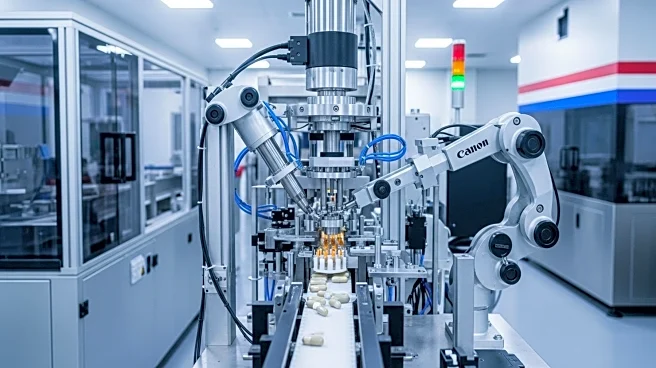What's Happening?
President Trump has announced a new trade policy imposing a 100% tariff on imported branded or patented pharmaceutical products, effective October 1, 2025. This move is part of a broader strategy to encourage domestic manufacturing and reduce reliance on foreign imports. The policy includes exemptions for companies that have initiated construction of manufacturing facilities within the U.S. Major pharmaceutical companies are responding by investing billions in U.S. manufacturing infrastructure to mitigate the impact of these tariffs and ensure market access. The FDA's PreCheck initiative is also supporting this push by streamlining site approval processes, impacting regulatory and supply chain strategies.
Why It's Important?
The imposition of tariffs on imported pharmaceuticals is a significant development for the U.S. pharmaceutical industry, as it aims to strengthen domestic manufacturing capabilities and secure supply chains. This policy could lead to increased investment in U.S.-based facilities, potentially boosting job creation and economic growth. However, the tariffs may also introduce uncertainty and complexity for global manufacturing and logistics planning, as companies navigate the new regulatory landscape. The initiative underscores the administration's focus on reshoring critical industries to enhance national security and economic stability.
What's Next?
The pharmaceutical industry is likely to experience shifts in manufacturing strategies and supply chain dynamics as companies adapt to the new tariff regime. The policy may prompt further investment in U.S. infrastructure, with companies reevaluating their global manufacturing footprint. Regulatory and supply chain professionals will need to leverage initiatives like the FDA's PreCheck program to manage timelines and ensure compliance. The long-term impact of these tariffs on drug prices and market access will be closely monitored by industry stakeholders.
Beyond the Headlines
The tariff policy raises questions about the broader implications for the pharmaceutical industry, including potential impacts on drug development and innovation. The initiative may also influence global trade dynamics and regulatory practices, as other countries consider similar strategies to boost domestic manufacturing. Ethical and legal considerations may arise as companies navigate the complexities of the new tariff regime and its impact on market access.









